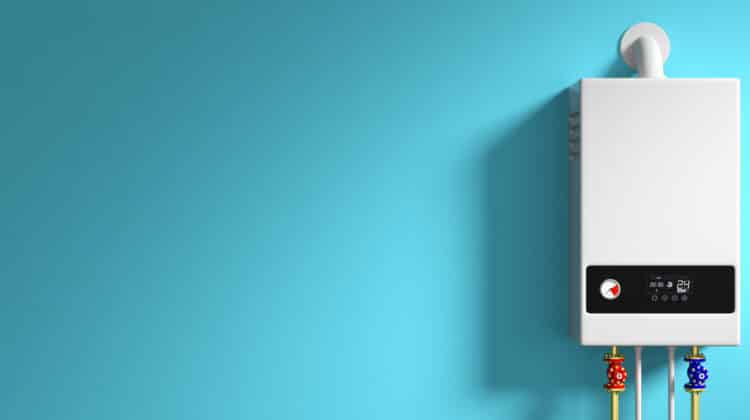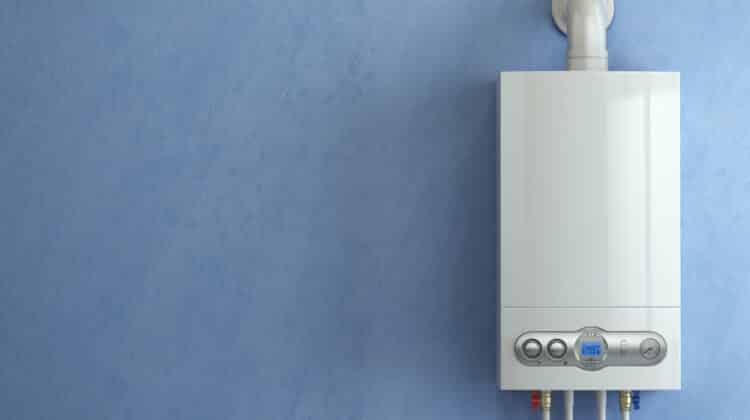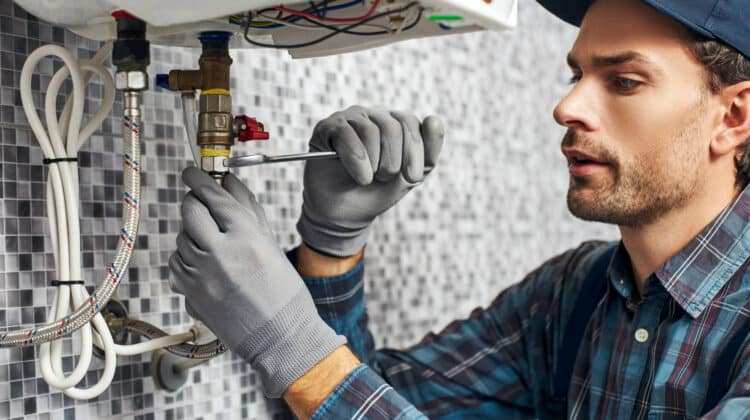A gas water heater is an important piece of equipment in all homes. In many cases, tank water heaters warm up water with the use of electricity or natural gas. This is then stored it inside a tank till it’s required. Given its crucial role, you may have asked: Can I convert my gas water heater to electric?
A water heater can last for about 8 years to 15 years. Then, it is only normal that you will need to change it at a point. Once you start checking out new heaters, you will be tasked with the decision of whether you want to get an electric water heater or a gas water heater.
If a conversion is what you’re looking for, then the older gas water heater’s gas line will also need to be turned off by a professional. However, the initial cost of setting up an electric water heater is often cheaper than those of a gas water heater.
Table of Contents
Gas water heater explained
Here’s how a gas water heater functions. A dip tube brings cold water in the tank of a gas-powered water heater. A gas burner is used to heat the water.
This burner burns a gas, discharging highly hot yet hazardous air into the water heater tank via a chimney in the center. The chimney exhausts the noxious air while simultaneously heating the chimney’s metal.
As the chimney heats up, the water around it heats up as well. Heat rises, and water heaters use this to circulate warm water through your home’s plumbing. The heat-out pipe transports warm water from the top of the water heater tank to the rest of the house.
When you turn on the hot water faucet, cold water enters through the dip tube, displacing the hot water and forcing it out the heat-out pipe. The thermostat, which is linked to the gas line and delivers the proper quantity of gas to the burner to attain the desired temperature, allows homeowners to specify the temperature they want their water to be heated.
Electric water heater explained
On the other hand, there’s the electric heater. The electric water heater functions comparably to a gas water heater.
It warms the water by bringing it in through the dip tube and heating it within the tank with the electric heating elements. The hot water in the tank rises and is distributed throughout the house via the heat-out pipe.
An electric water heater has a thermostat, a pressure and temperature relief valve, a drain valve, an insulated storage tank, and an anode rod, just like a gas water heater. The only significant difference is that the water is heated by electric components and hence connected to a power source.
Is it possible to convert a gas water heater into an electric water heater?
It is possible to transition from a gas to an electric water heater. However, it is unusual.
Electric water heaters have a longer service life than gas water heaters because they have fewer internal parts. They can also help you save space in your house.
The electrical system will almost certainly need to be changed to suit the new appliance during installation. The old gas water heater’s gas line will also need to be turned off by a professional. However, the initial expenditures of installing an electric water heater are often cheaper than those of a gas water heater.
It is also possible to just purchase a new electric hot water tank, but it would have been costly and useless if the gas hot water tank is in perfect working order. Furthermore, adding a commercial electric hot water tank would necessitate rewiring one’s home to provide a 240 V circuit to the water tank’s position.
How to convert a gas water heater to an electric water heater
- Examine your electrical system — Before you begin the process of converting a gas water heater to an electric water heater, you must first determine whether your present electric panel is capable of feeding an electric water heater.If not, upgrading to a larger panel may be a job you don’t want to take on, as it may require introducing a larger service line into your home. A licensed electrician should do all electrical work.
- Make use of electrical wiring — Bring an electrical cable down from the electrical panel, run it below the house, and then route it up into the water heater closet to connect to your water heater.Make sure that you utilize outdoor-rated electrical wiring. Electrical wiring should be at least 10 gauge, and a double 30-amp fuse should be installed.Check the manufacturer’s specifications for your electric water heater.
- Disconnect and remove the old gas water heater — Turn off the water and gas supply to the old water heater. Remove the water.Make use of a yard hose. Raise the pressure relief valve’s lever to let air into the tank to assist the tank empty. If the pressure relief valve’s lever is jammed, cut a waterline from the water heater’s top.Connect the gas line and close the open end. Better still, remove the gas connection from the water heater closet entirely because it is no longer required.
- Disconnect the vent and/or chimney — Remove and fix roof or plug chimney with fiberglass insulation.Remove any old waterlines. Don’t even try to utilize the rusted ends of those ancient waterlines.Make plans to replace the existing system. Take the old water heater out of the closet and toss it in the trash.
Comparing a gas water heater and electric water heater
Is it more efficient to use a gas or an electric hot water heater?
While natural gas hot water heaters are less expensive, electric heaters are more efficient because of the way the heaters work. There are high-efficiency gas heaters on the market that consume much less energy in the long run.
A gas heater consumes more energy and emits garbage into the atmosphere. Because the gas waste absorbs some of the heat, it is inefficient compared to electric water heaters.
On the other hand, electric heaters use the majority of the energy they receive to heat water, making them more energy-efficient. There are certain high-efficiency gas heaters on the market that consume less energy overall.
Is it necessary to use electricity with a gas water heater?
Due to the fact that gas water heaters do not require electricity as fuel, many homeowners believe they will function in the event of a power loss.
It depends on the sort of gas water heater you have. Because they are not reliant on mains electricity, gas water heaters with electric pilot lights will continue to function.
The maintenance obligations of either water heater
When comparing the maintenance needs of gas and electric water heaters, you’ll see that gas heaters demand more care.
To avoid deposits from forming at the bottom of the tank, you’ll probably need to have both systems cleansed on a regular basis. To avoid gas leaks or sediment accumulation, the gas line and gas tanks for gas heaters must be checked on a regular basis.
In any event, we recommend that both systems be inspected at least once a year to guarantee that your water heater lasts as long as possible.
The environmental consequences
Electric heaters are, of course, better for the environment. These systems are less harmful to the environment since they are energy efficient and may be fueled by renewable energy sources.
Natural gas, on the other hand, is extracted from the earth in a wasteful and damaging manner by gas water heaters. This emits a significant amount of greenhouse gases into the atmosphere. As a result, gas heaters are less environmentally beneficial in general.
The installation of gas and electric water heaters
The methods for installing gas and electric water heaters are very simple. Switching from an electric to a gas water heater, on the other hand, might be a challenge.
Because the gas lines will need to be run to a new place, this operation will be more challenging. This necessitates the installation of a new vent, which leads to cutting or drilling into the side of your house. As a result, the cost and duration of installation will rise.





